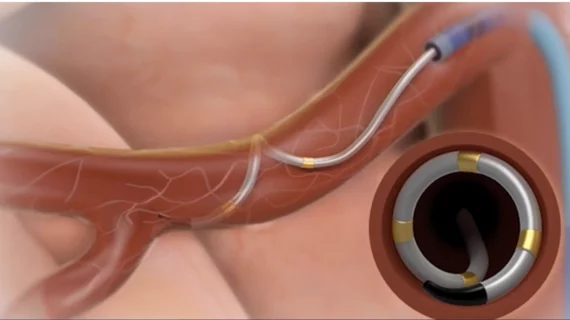Renal denervation is associated with improved blood pressure (BP) control and a reduced risk of adverse cardiovascular outcomes, according to two late-breaking clinical trials presented at EuroPCR 2022 in Paris.
Both clinical trials focused on three-year data related to Medtronic’s Symplicity Spyral Renal Denervation (RDN) System, which was designed to lower BP through the use of a curling catheter that ablates overactive nerves.
Renal denervation and blood pressure control: The SPYRAL HTN-ON MED trial
The first presentation examined data from the first 80 patients enrolled in the SPYRAL HTN-ON MED trial. While 38 patients were treated with the Symplicity Spyral system, another 42 patients underwent a sham procedure.
Researchers reported that, after three years, radiofrequency RDN was associated with improvements in BP control, including a much higher time in target range (TTR), compared to sham procedures. At ACC.22 in April, previous data from the SPYRAL HT-ON MED trial was shared with the public; researchers noted that the Symplicity Spyral system was associated with consistent reductions in BP when combined with antihypertensive medications.
“By focusing on TTR in patients with uncontrolled hypertension, we can better understand how RDN can help control blood pressure and sustain a healthy level,” David Kandzari, MD, chief of the Piedmont Heart Institute and lead principal investigator of the SPYRAL HT-ON MED trial, said in a prepared statement from Medtronic. “These three-year data showed us that RDN nearly doubles the time patients spend in their target blood pressure range, regardless of anti-hypertensive medications, reinforcing the long-term benefit of the procedure.”
Renal denervation and major adverse cardiovascular events: The GSR-DEFINE study
The second presentation included three-year data from the GSR-DEFINE study, which focused on patients from 42 different countries who were treated with the Symplicity Spyral system. The study aimed to enroll as many 5,000 patients presenting with hypertension.
Overall, patients treated with radiofrequency RDN spent nearly 35% of their time in the TTR; every 10% increase in TTR was associated with a 16% decrease in the patient’s risk of a major adverse cardiovascular event (MACE).
“The findings from GSR-DEFINE further underscore the long-term safety and effectiveness of the Symplicity system in patients with uncontrolled hypertension, while also lowering their risk of major cardiovascular events,” Felix Mahfoud, MD, a cardiologist at Saarland University Hospital in Germany, and member of the SPYRAL HTN executive committee, said in the same Medtronic statement.
The Symplicity Spyral RDN system is still only approved for investigational use in the United States, Japan and Canada, though it is approved commercially in many other parts of the world. According to Medtronic, more than 20,000 RDN procedures have already been performed using this system.
Related Interventional Cardiology Content:
Renal denervation linked to significant blood pressure reductions after 3 years
Key interventional cardiology takeaways from ACC.22
Medtronic’s more deliverable drug-eluting stent gains FDA approval
SCAI 2022 late-breaking clinical research presentations announced
Medtronic Announces Renal Denervation Pivotal Trial for the Treatment of Hypertension
Renal denervation linked to significant drops in blood pressure
Transcaval TAVR outperforms transaxillary TAVR when femoral access is not an option

